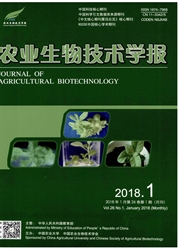

 中文摘要:
中文摘要:
对适应性饲养到30日龄时的60只肉鸡进行热应激处理,通过热休克蛋白70(heat shock protein 70,HSP70)mRNA荧光定量PCR(fluorescence quantitative PCR,FQ-PCR)方法检测热应激处理肉鸡组织中HSP70 mRNA含量。虽然受试鸡肝脏和心脏的HSP70 mRNA水平在热应激6h时略低于对照组(P〉0.05),但随持续性高温应激时间的延长,HSP70 mRNA水平逐渐升高,热应激18h时应激肉鸡肝脏和心脏HSP70 mRNA水平达最高水平,明显高于对照组(P〈0.01)。实验选用3-磷酸甘油醛脱氢酶基因(GAPDH)作为内参照,体外转录的RNA和阳性质粒作为两种标准品。结果显示,实验所建立和优化的FQ-PCR反应体系是理想的。
 英文摘要:
英文摘要:
After 30-days fed adjustably,sixty broilers were heat stressed. By fluorescence quantitative PCR (FQ-PCR),heat shock protein 70 (HSP70) mRNA in heat stressed broilers was measured. HSP70mRNA transcription in the livers and the hearts of the heat stressed broilers was less reduction than that of the control group (P 〉0.05) at the 6 h heat stress. HSPTomRNA transcription level increased gradually with prolonging of heat stress and got the highest transcription level at the 18 h heat stress (P〈0.01). Glyceraldehyde-3-phosphate dehydrogenase (GAPDH) gene was served as the internal reference, and RNA transcribed in vitro and positive plasmid were served as the standards in this experiment. The result showed that FQ-PCR system established and improved in this experiment was effective.
 同期刊论文项目
同期刊论文项目
 同项目期刊论文
同项目期刊论文
 Localization of Heat Shock Proteins and Histopathological Changes in the Kidneys of Transported Pigs
Localization of Heat Shock Proteins and Histopathological Changes in the Kidneys of Transported Pigs 期刊信息
期刊信息
